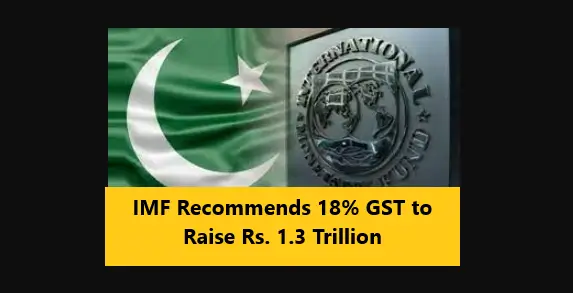IMF Recommends 18% GST to Raise Rs 1.3 Trillion.
IMF Proposes 18% GST Hike in Pakistan: Potential Boon or Burden?
The International Monetary Fund (IMF) has proposed a significant shake-up of Pakistan’s tax system, recommending an 18% increase in the Goods and Services Tax (GST) to generate an additional Rs. 1.3 trillion in revenue.
Read More: IMF Positive for FBR to Collect Record Taxes in FY24
This proposal has sparked widespread debate, with both potential benefits and concerns raised.
Key Points of the IMF Proposal:
- Increase GST Rate to 18%: The IMF suggests raising the standard GST rate from its current 17% to 18%, encompassing various goods and services.
- Eliminate Tax Exemptions and Schedules: The proposal seeks to cancel certain existing tax schedules and exemptions, including the Fifth Schedule (exempting specific goods) and limitations on exemptions under the Sixth Schedule (primarily for residential property transactions).
- Standardize GST Rates: The IMF recommends a single standard GST rate of 18% for all goods and services, with the exception of essential items like food staples, education, and healthcare, which could be taxed at a reduced rate of 10%.
- Eliminate Reduced Rates and Compliance Measures: The proposal suggests cancelling reduced tax rates under the Eighth Schedule and eliminating compliance-related tax policies like minimum taxes and surcharges.
- Streamline Tax System: The overall aim is to simplify and streamline the GST system by reducing complexities and distortions while generating additional revenue for the government.
Potential Implications:
- Increased Revenue: The proposed changes have the potential to significantly boost government revenue by Rs. 1.3 trillion, potentially addressing Pakistan’s budget deficit and facilitating economic growth.
- Impact on Inflation: While the IMF hasn’t assessed the potential inflationary impact of this significant GST hike, concerns exist that it could lead to price increases across various sectors, potentially impacting the cost of living for consumers.
- Sectoral Impact: Different sectors of the economy could be unequally affected by the proposed changes, with businesses and consumers in certain sectors potentially experiencing a larger burden compared to others.
- Administrative Challenges: Implementing such extensive changes to the tax system might pose administrative challenges for the FBR, requiring efficient planning and execution.
Conclusion:
The IMF’s proposal for an 18% GST hike in Pakistan is a complex and far-reaching one, with both potential benefits and drawbacks. While it could offer a significant revenue boost for the government, concerns remain regarding its potential inflationary impact and uneven distribution of burdens across different sectors. Carefully evaluating the proposal’s potential consequences and ensuring its implementation is accompanied by robust social safety nets will be crucial for mitigating potential negative impacts and ensuring the success of this reform.
Note: The information above might not be accepted 100%. Please verify from your own sources. We will not be responsible for any kind of loss due to our content.
For more news, please visit Munafa Marketing.




